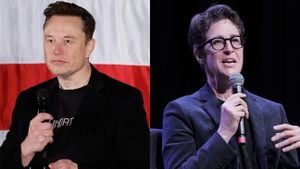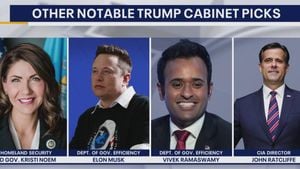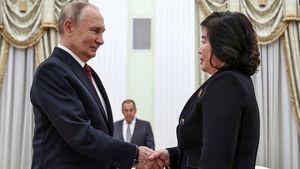A federal judge has dismissed all charges against President-elect Donald Trump concerning both his election interference case and the handling of classified documents, following a request by Special Counsel Jack Smith. This decision marks a significant milestone as it illuminates the intersection of legal, political, and historical narratives surrounding the former president’s actions post-2020 election.
On November 25, 2024, U.S. District Judge Tanya Chutkan ruled to grant Smith's motion, indicating the dismissal would be without prejudice, allowing for the possibility of future litigation, albeit highly unlikely due to the expiration of statutes of limitations and established legal precedents concerning presidential immunity.
Smith’s request to dismiss the case stemmed from long-standing policies at the Department of Justice which hold it unconstitutional to prosecute sitting presidents. According to his submission, “That prohibition is categorical and does not turn on the gravity of the crimes charged or the strength of the Government’s proof,” emphasizing the significant constitutional arguments at play.
The dynamics changed considerably following Trump’s recent re-election, as Smith noted the outcome of the election impacted the nature of the cases. His motion pointed out the dual interests facing the country: ensuring the president is not unduly burdened by legal challenges, and maintaining the integrity of law enforcement processes. Smith also noted, “The circumstances have changed,” highlighting how Trump’s re-election complicated the legal pathways previously laid out by his office.
This dismissal arrives after Trump was first indicted on various felony counts from charges connected to his efforts to overturn the legitimate results of the 2020 election. The charges included conspiracy to defraud the United States, obstruction of official proceedings, and conspiracy against rights. Smith had previously articulated the seriousness of these claims, but the unprecedented aspect of the president-elect facing federal charges created unique legal dilemmas.
Critics had often pointed to the issue of political motivations driving these cases, and advocates of Trump’s claims have reiterated such sentiments following their dismissal. Trump spokesperson Steven Cheung remarked on the dismissal as “a major victory for the rule of law,” signifying the broader narrative of perceived politicization of justice being bandied about among Trump’s supporters.
Chutkan’s ruling reflects the culmination of mounting legal scenarios weighing on Trump leading up to this point—a path characterized by numerous legal challenges, including previous impeachment trials. Trump’s legal defense tactics have focused heavily on the notion of presidential immunity, as bolstered by recent Supreme Court rulings emphasizing this protection concerning official acts undertaken during his presidency.
Returning to the origins of these cases, Trump faced scrutiny for allegedly conspiring to replace legitimate electoral college votes with his own slate of electors from battleground states, alongside attempting to coerce officials within the Justice Department to overturn the results from the 2020 election. The intricacies of Trump’s legal battles have repeatedly been underscored as public interest elevated by the January 6 Capitol riot, which was partially spurred by his unfounded allegations of election fraud.
Beyond just the election interference-related case, Smith's office also dropped the appeal concerning Trump's classified documents case, which also saw significant legal back-and-forth, including accusations of improper appointments during Smith’s oversight of these investigations. Once again, Chutkan’s dismissal aligned closely with longstanding DOJ policies and illustrative formalities around presidential conduct.
The Supreme Court's preceding rulings have fortified Trump's position to claim significant immunity based on executive acts, complicate the legal terrain heading forward, and prompt discussions on how future administrations might navigate similar thorny issues. Legal scholars remain divided on whether this sets precedents or simply reaffirms the principle of presidential immunity during and post-presidency.
After dismissal, Trump remains vocal, asserting the legal processes he endured were merely instruments targeting his political aspirations. While Smith’s withdrawal of charges follows his previous announcement addressing the necessity to cease litigations and reports found within these unique and unresolved legal frameworks, the governmental and political fallout remains poised to ripple across the political life of the United States.
Looking at both cases’ ramifications, there lies the broader question: Does this scenario enforce the idea of political self-preservation through legal means, or does it constitutively reinforce the concept of rule and process through the lens of constitutional rights and protections? The answers entwined here will likely navigate not only the Republican party but the larger fabric of American political governance.
The end of these cases underlines the blend of law and politics, and as Trump prepares to reclaim his position at the helm, the continuing dialogues surrounding justice, accountability, and historical precedent promises to remain at the forefront of national conversations.
With his re-ascendancy starting just weeks away, the trajectories of candidates across the political spectrum, and especially Trump's explicitly contested conduct and legal intricacies, showcase the complex web of law intertwined with American political society, manifesting narratives of triumph, defeat, and constitutional challenges echoing throughout the halls of justice.



